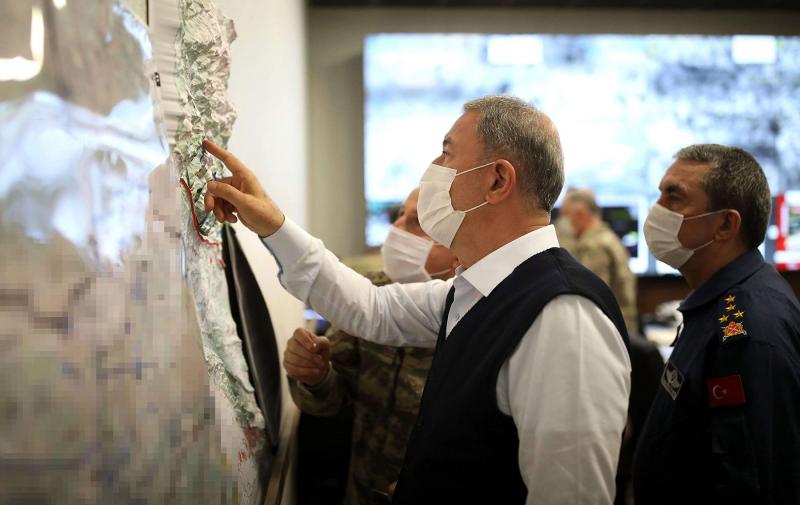BAGHDAD – Turkish Defence Minister Hulusi Akar began an official visit to Iraq on Monday that observers considered an extension of Turkey’s efforts to impose its security and military equation on Iraq.
This equation, which Ankara has already started implementing on the ground, is based on making Iraqi territories an advanced line of defence for Turkish security and a battleground for Turkey’s war against Kurdistan Workers’ Party (PKK) militants.
Ankara is counting on imposing its equation by force through the intensification of its military operations inside Iraq and the expansion of these operations beyond the border areas inside Iraq.
At the same time, it is betting on persuading Iraqi authorities to cooperate and accept the presence of Turkish forces on Iraqi soil by bargaining with the government of Prime Minister Mustafa al-Kadhimi over vital issues, particularly the issue of water resources.
Akar’s visit, which is expected to last for two days and to include Erbil, the capital of Iraq’s Kurdistan region, came as Kadhimi’s government raised the water issue with the hope of reaching a permanent and clear agreement with Turkey on the water resources of the Tigris River.
Turkey has embarked on huge projects on the Tigris, which are is expected to lead to a reduction of Iraq’s share of the river’s water resources.
Iraqi Minister of Water Resources Mahdi Rashid recently announced that his country has formally handed over to Turkey a protocol for cooperation on water resources, which was recently approved by the Iraqi council of ministers.
The cooperation protocol includes a proposal for regular water releases that Iraq wants to obtain from the Tigris.
Iraqis do not rule out that the government of the Islamist Justice and Development Party (AKP) in Turkey, known for its opportunistic tendencies, would seek to pressure Iraq into accepting the establishment of Turkish military bases inside its territory in exchange for the share of water resources requested by its government.
Kadhimi said during a meeting with Akar that his country rejects “any terrorist threat against Turkey from Iraqi soil.”
A joint statement after the meeting stated that the two sides “discussed issues of common interest, the strengthening of military cooperation between Iraq and Turkey within the framework of general cooperation, and the consolidation of the principle of respect for Iraq’s sovereignty over all its territories.”
Over the past year and after Turkish forces launched a large-scale military operation in pursuit of PKK militants inside Iraqi territory without coordination with its government, Baghdad protested Turkey’s violation of Iraq’s sovereignty and the sanctity of its soil, especially since the “Claw-Tiger” operation resulted in deaths and injuries of Iraqi civilians and military personnel.
Last August, while the Iraqi government was waiting for an apology from Ankara for killing two officers and a soldier from the Iraqi army in Turkish air strikes on the Bradost region of Kurdistan, Erdogan’s government held Iraq responsible for what happened, accusing it of condoning the PKK’s activities and threatening to push its operations across the Iraqi border against party militants if Baghdad continued to overlook their presence in the area.
The Iraqi foreign ministry said at the time that Baghdad had canceled a visit by the Turkish defence minister to the country and summoned the Turkish ambassador to inform him of “Iraq’s firm rejection of the acts of aggression and violations against his country.”
In another step that fundamentally contradicts the principle of respecting state sovereignty, Turkey maintains small military bases in northern Iraq, which it established unilaterally and is still refuses to evacuate.
On the Turkish side, Akar expressed his country’s readiness “to provide support and advice in the fields of combating terrorism, training and joint maneuvers.”
Iraqis, especially Kurds, fear that Turkish intervention in Iraq will reflect Ankara’s ambitions of territorial encroachment in continuation of its ambitions in neighbouring Syria, where Ankara controlled large parts of northern and eastern Syria under the same pretext — the pursuit of armed Kurdish factions that Ankara considers terrorist organisations.
Iraqi sources say that an outline of a Turkish security strip has begun to take shape inside Iraqi territory, as they expect Turkey not to withdraw from the areas of Operation “Claw-Tiger,” given the Turkish government’s previous policies in Syria, and even in Iraq.
A senior Turkish official explained that Turkey’s plan is to establish “temporary bases in the region to prevent the use of the areas cleared (from PKK militants) for the same purpose again,” adding, “there are already more than ten temporary bases. New bases will be established. ”
Iraqi sources confirm that Turkish talk about “temporary bases” is merely a cover for permanent military presence, which is illustrated by Ankara’s refusal to remove the military base it established years ago in Bashiqa near Mosul despite repeated Iraqi demands.
Source: Arab weekly



